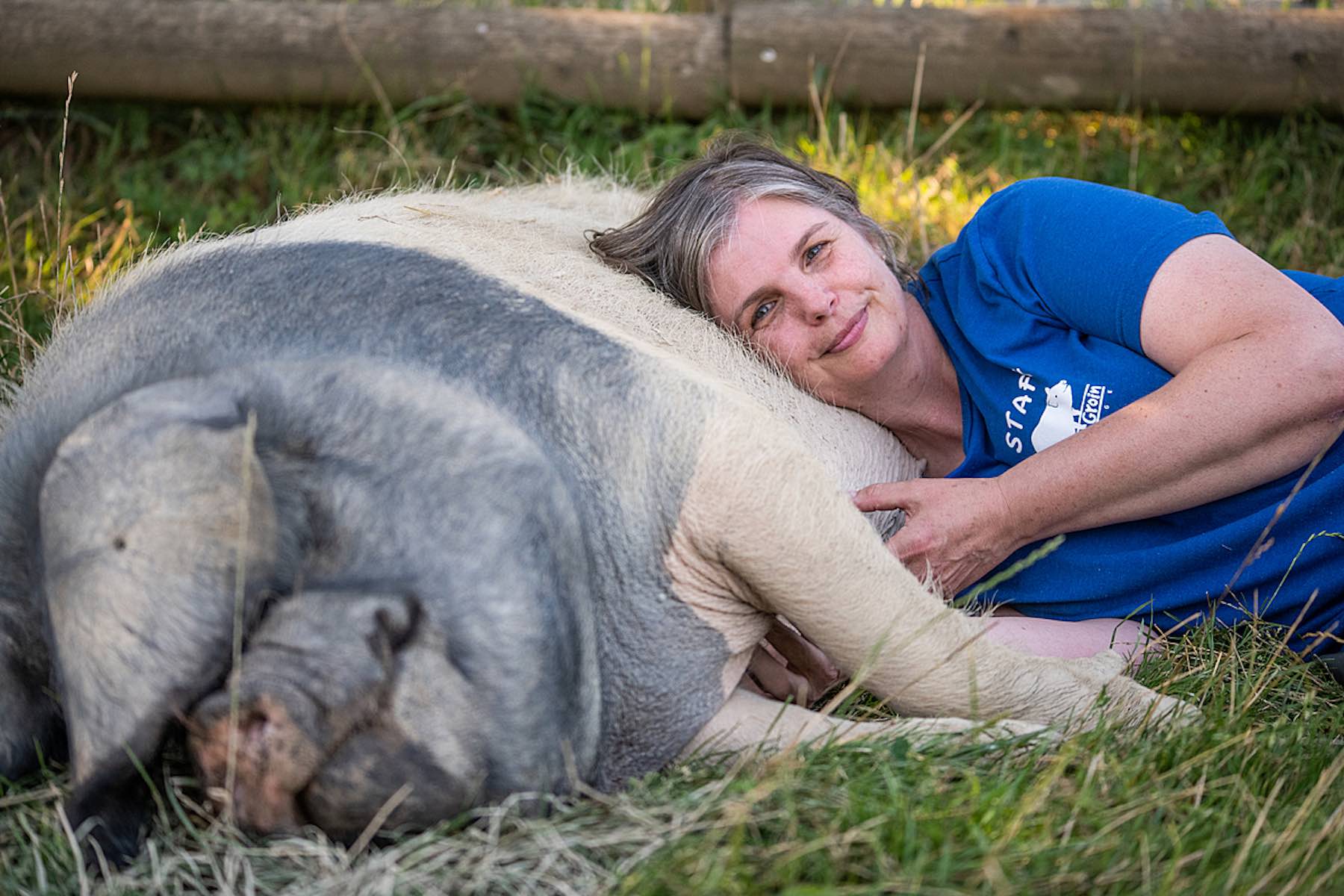The most commonly pledged New Year’s Resolution every January is to lose weight. But if everyone who pledged it achieved it, we would all be living in smaller bodies, and the diet industry could clap itself on the back and celebrate a job well done. But, of course, that’s not the industry’s aim, and nor is sustained weight loss a likely outcome for those who undertake a diet. In this blog, we ask: What makes us so preoccupied with losing weight? Why don’t diets work? Is being bigger as unhealthy as we are taught? And how can we make peace with our bodies and live in a happy, healthy, sustainable way? (Hint: it requires no dieting at all. In fact, it positively avoids it.)
Fatphobia
Society judges us for the way we look, and specifically for the size of our bodies. It seeks to equate larger bodies with various negative personality traits, as though what we look like somehow represents our character. This outdated, unscientific view belongs to the eugenicists. Nonetheless, we are each conditioned from a very young age to aspire to be thin, as if this somehow correlates with being a better person, having a more productive life, and even with happiness itself. Magazines and social media routinely shame people in larger bodies, and there is a lack of positive representation of fat people in TV, movies, and commercials; lazy comedians take aim at fat people; larger people often experience discrimination in the workplace and suffer daily microaggressions; even medical practitioners direct patients to lose weight before they have made any effort to find out what is really ailing them. Why is the size of our bodies other people’s business?
One of the most common fatphobic arguments used is that it is fat people’s own fault to be bigger in size due to laziness, excessive eating and unhealthy habits. Behind a supposed “concern” for fat people’s health, many people hide discrimination and exclusion. As we can see, weight is not related to health, and there can be multiple reasons why our bodies are different in size.
The Diet Industry
The weight loss industry is worth more than $70 billion. Its vast profits rely on people feeling so bad about their bodies that they will do anything to change them. The industry makes calorie-restricted foods that keep us hungry but fail to help us keep the weight off; it makes pills that come with unpleasant and sometimes dangerous side effects; it offers us surgery where we even risk our own lives in pursuit of thinness. Does the industry have our best interests at heart? Consider these three leading weight loss companies…
- Weight Watchers’ shareholders are largely investment firms and hedge funds
- Jenny Craig is owned by H.I.G. Capital
- Medifast Inc.’s leading shareholder is investment firm The Vanguard Group
The quest for weight loss is highly profitable, but it will only remain profitable so long as it doesn’t work.
The “Obesity Epidemic”

Newspapers are full of stories of national populations getting fatter year on year, and they tend to cite Body Mass Index (BMI) as hard proof. BMI was invented in the 1830s by a Belgian statistician, not a medic, whose interest was in discovering “the average man” as he believed this would reveal the ideal, the closest human being to perfection. Unsurprisingly, perhaps, all his measurements were taken from European white men. What is surprising, however, is not just that his system of categorizing humans by weight is still used today, but that the medical world accepts and promotes BMI as a marker of health. BMI does not take into account muscle mass, fat distribution, the fact that populations are taller than 200 years ago, and it particularly fails women, people of color, and athletes.
So, first we take a flawed and outdated categorization system, and then we misapply it! Consider this paragraph from Linda Bacon’s excellent book, Health At Every Size:
“At least seven of the nine members on the National Institute of Health’s (NIH) Obesity Task Force were directors of weight-loss clinics, and most had multiple financial relationships with private industry. Thanks to this task force, one magical night in June of 1998, twenty-nine million Americans went to bed with average [BMI] figures and woke up fat. They woke up with presumed increased type 2 diabetes, hypertension, and atherosclerosis, and a government prescription for weight loss. Of course, nobody gained a pound. The task force had simply lowered obesity standards, a change which was obviously favorable for private industry.”
In short, it suits investment funds and shareholders if we are deemed ‘fat and unhealthy’, even if the data has to be manipulated to achieve this.
Why Is It So Hard To Lose Weight?
Nonetheless, it is clear that more people, particularly in the global north, are living in larger bodies and are unable to lose weight, despite many years of committed attempts. To get the full picture, we recommend reading Why Diets Make Us Fat by Sandra Aamodt or Health At Every Size by Linda Bacon, but here is some food for thought:
- Humans existed through 200,000 years of food scarcity and are programmed to get the most calories with the smallest effort and to hold on to them.
- Children see 40,000 food ads per year. How many of those do you think are for fresh fruits, grains, vegetables, and wholesome healthy foods?
- Processed food companies lobby governments to alter school food guidelines, farm bills, nutrition recommendations, and much more in their favor.
- Fast food companies put the blame onto the consumer, saying their high-fat, processed foods are fine as part of a balanced diet. The implication is that we should simply exercise willpower not to eat them regularly.
- Stress reduces willpower, and when willpower is depleted, people behave according to long-held habits. Willpower always runs out.
- Severe childhood stress increases the likelihood of obesity as an adult.
- Microaggressions and unwanted comments add to stress, and stress increases our chances of gaining weight.
- Stress leads to insomnia, which leads to stress. Overproduction of stress hormones are linked to visceral fat gain.
- Loneliness and obesity are connected.
- People with less diverse gut bacteria are more likely to be overweight or obese. This can be connected to a diet of meat and to antibiotic use.
- Children in the west typically have 10-20 courses of antibiotics before they are 18 years old.
- Other medications can also lead to weight gain.
- Our bodies are genetically programmed to defend a higher weight range. This makes it easy to put on weight, but very hard to lose it. Plus, the defended range creeps up over the course of our lifetimes, making weight gain almost inevitable.
Fit or Fat? Can We Be Both?

The answer is yes, we can. Fitness and fatness are entirely separate, but so too are health and weight. Being larger does not necessarily make you less healthy. There are so many variables, but having some extra weight may actually be beneficial. For example, this is from The National Geographic:
“In its revised study, the CDC [Centers for Disease Control] found that overweight people actually live longer, with 86,000 fewer deaths in the overweight category than in the normal weight category. And underweight people died more often than either overweight or obese people, suggesting that the thinnest people in the U.S. may be at a greater health risk.”
Where, and how we carry weight, how much weight we carry, our other lifestyle choices and habits, our genetics, and a lot more can affect our health and our fitness. So, making sweeping generalizations about people’s health based on what we can see of the size of their bodies is just plain inaccurate, as well as being offensive.
Goals That Serve Us

We want people to be healthy in their minds and bodies, and to feel connected and loved within healthy societies on a thriving planet. In such an ideal world, the size of our bodies would not form any part of a public debate. But, we are not in an ideal society; we are in a capitalist society where shame, fear, and dissatisfaction are manufactured and stoked in order to boost profits. And that means, even when we know the complexities of weight gain, and that the odds are stacked against us when it comes to losing weight, many of us still feel dissatisfied with larger bodies and embark on a new year diet.
But, if we take the time to think about the outcome we really want, we may come up with a different solution than lowering the numbers on the scale. Perhaps what we are looking for is to enjoy food without feeling guilt or compulsions, to feel more positive in our minds, to have more energy, to notice an improvement in our health, experience a welcome increase in self-esteem, and to feel at home in our own skin. If we could have all of that, would we worry what the scales said?
Diets are highly unlikely to lead to long-term weight loss, and they certainly won’t make us happy. But there are ways we can achieve something profoundly positive for ourselves that don’t require fad diets, hunger, and fatigue, dangerous pills, and upsetting side effects. Adopting these can lead to a lifestyle change that is sustainable and joyful, and fully in our control.
Our five recommendations are:
- Mindful and intuitive eating
- Joyful moving
- Being around wonderful people
- Finding and adopting stress-reducing techniques
- Connecting with animals
Mindful and Intuitive Eating
Mindful eating asks us to pay attention to our body’s cues so we know to eat when we are hungry and to stop when we are sated. It asks us to notice the foods we eat, their flavors and textures, and to actively choose foods that are nourishing and enjoyable.
Intuitive eating is a broader framework that encompasses mindful eating. The 10 principles of intuitive eating include ditching the diet mentality, honoring our hunger, making peace with food, honoring our feelings without using food, and becoming attuned to our inner wisdom so we eat well and stay well.
Joyful Moving
For many of us, exercise is seen as either a punishment or something we must endure so we can reward ourselves with a piece of cake or a candy bar. What a way to ruin something that should be utterly joyful! And there is joy in moving our bodies. It is fun in itself, it can give us a priceless sense of self-worth, and it releases feel-good hormones. Movement helps us sleep better at night, so we wake refreshed and in a positive frame of mind, and it helps keep us healthy in countless ways, from heart health to mental health.
Forget what you know about ‘exercise’ and try out a variety of sports and practices until you find one or more that you love. It could be a team sport that helps you find a new social group. It could be swimming in the river at dusk – just you, the sunset, and the birds. It could be kickboxing or pole dancing, or long jump or hockey. It could be BMX or skateboarding, trapeze work, rock climbing, table tennis, surfing, skiing, skating, or hiking. Find the movement you love and it will serve you well.

Be Around Wonderful People
Fatphobia is all around us — on television and social media, in magazines and newspapers, and on billboards and other advertising. It’s also entrenched in the attitudes of the people around us, including in ourselves, whether we recognize it or not. Sadly, it also exists in the vegan world. We recommend reading Chelsea Lincoln’s blog on Creating an Inclusive Movement for Fat Vegans to find out more about this, so that we may address any discrimination we may have unknowingly internalized. It’s clear we cannot avoid it altogether but we would do well to carve out spaces where it does not negatively impact us.
If there are people in our lives who make us feel bad about our bodies, we can take steps to minimize their impact. That may be ensuring we have an ally with us whenever we meet with them, speaking to them directly about their effect on us, or even phasing them out of our lives altogether. We can also log off, liberally use the ‘block’ button on social media, and actively seek out kinder, more loving, more open-minded people.
Reducing Stress
Stress is ubiquitous in our world. We are stressed about work, family, money, health, climate breakdown, world events, and so much more. Stress in small doses can be positive, but when it is chronic, it can range from being uncomfortable to utterly debilitating, and it can lead to burnout. We cannot avoid stress, but there are tried-and-tested ways to manage it. Exploring these, practicing them, and building them into our daily lives can help us cope with difficult periods to better protect both our mental and physical health.
Meditation, breathwork, and mindfulness can certainly give us techniques to manage stress, and so can yoga. There are free classes and sessions available on the internet, as well paid-for apps and classes, and in-person sessions in the community. Walking is another profoundly helpful activity to manage stress, and if it can be combined with being in nature, then we get a double dose of goodness. Being in nature — even if it is an urban park or your own backyard — can allow anxiety to settle and dissipate. Research shows that even looking at images of nature, or listening to recorded birdsong or trickling streams, can lower our stress levels.
Eating healthily, moving joyfully, connecting with friends, and finding an evening wind-down routine to help you sleep better are all profoundly important stress reducers.

Connect with Animals
You know who does not judge us for the size of our bodies (or whether we have pimples, bad hair, or have woken up in a grumpy mood)? Animals! Animals are free of such judgmental attitudes, and if you want to know what unconditional love feels like, spend some time with a rescued dog.
Of course, it’s not just dogs who accept us for who we are. No animal judges us on our looks but solely on how we treat them. We recommend spending a day (or more) volunteering at an animal sanctuary, getting to know the cows, sheep, pigs, chickens, dogs, cats, goats, and whoever else may be living there. You are likely to feel an incredible connection to animals who live in the moment, are free to be themselves, and are not victims of the judgment culture that humans are brought up in.
The Benefits of Being Vegan
When we talk about eating for improved health, there are many ways in which being vegan can be beneficial. Enjoying a whole food plant-based diet is linked to reduced heart disease, type 2 diabetes, and some cancers. It can also improve hair, skin, and energy levels, and new vegans may find a range of benefits from reduced inflammation to better sleep to improved digestion. Being vegan is a positive choice for our gut microbiome, too, and that is connected to a whole raft of improved health outcomes.
Being vegan can give us a profound sense of peace and contentment, knowing we are treading lightly on the Earth and that our meals are not costing others their lives.
Being vegan can lead to improved mental health, and can help us feel more rooted in nature. And that is an incredible gift!
Being vegan can widen our circle of compassion, helping us to understand how our choices affect others, and that can also make us consider how to be kinder to ourselves, too.
Being vegan can help us connect with a global movement of like-minded people, most of whom are similarly open-minded, thoughtful, and compassionate.
Being vegan is about embracing abundance! The food can be both delicious and satisfying.

New Year’s Resolutions Worth Making
This New Year, shall we abandon the concept of a “new [thinner] you”, and instead accept that the old you is wonderful just as you are. Shall we ditch all ideas of making diet companies’ bank balances fatter, and instead commit to integrating inexpensive but positive practices into our lives that will make a real difference to how we feel about ourselves? The tried-and-tested practices we recommend are already covered in this blog. To recap, they are:
- Trying out a whole food plant-based diet and eating mindfully
- Building joyful movement into your life
- Reducing stress through prioritizing sleep, yoga, meditation and / or other practices
- Finding a circle of friends who see you and love you for who you are
- Spending time in nature
- Spending time with rescued animals
And there is one more resolution that we at GenV will make: We pledge to speak up for those who are judged, mocked, ostracized, or discriminated against because of their weight.
We wish you a happy, healthy, joyous new year.



